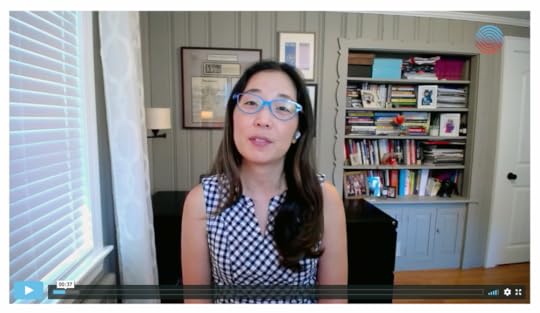Michelle R. Weise's Blog, page 6
October 30, 2020
5 Critical Elements to Support Learners (eLearning Alchemist)
In this #WomenInLearning episode, Clint Clarkson interviews the Chief Innovation Office of the Strada Education Network, Michelle Weise. They discuss how Strada Education Network is working to help the future of work and the 5 critical elements needed to support learners now and for the future.
Are you ready for the future of work? (Dr. Dawn on Sirius XM)
On SiriusXM radio, Dr. Dawn welcomes Dr. Michelle Weise, author of the forthcoming book "Long Life Learning: Preparing for Jobs that Don't Exist Yet" to discuss disruption in education, how the market is changing and what you need to do NOW to be prepared for the future of work!
Dear Colleges, Please Do Not Build More Degree Programs in this Time of Crisis (EdSurge)
first published on EdSurge
Willing or not, thousands of institutions of higher education have been thrust into creating some version of online education for their learners during this pandemic. And with millions of Americans suddenly jobless, early research suggests that as they have in past recessions, people will turn to higher education — likely online.
But the last thing we need right now is more online degree programs or credentials.
By some estimates, roughly 738,000 unique credentials flood the education and labor markets already. You’d think all these options would offer learners a selection of precise career pathways. Instead, the sheer number of programs creates more hiring friction between learners and employers. Employers already are struggling to differentiate between the vast array of signals they see on resumes and LinkedIn profiles.
The solution is not another type of degree or a “microcredential.” The millions who have lost and are losing their jobs will be focused on making ends meet. They are seeking new models that allow them to quickly acquire and demonstrate the skills employers want.
The world needs targeted education.
Newly laid-off workers need ways to prove what they know, discover the hidden skills and capabilities they’ve honed over years of work experience and transfer those into new domains and perhaps an entirely new industry. They may still have skills they need to learn. But they don’t have the time or resources to fill those gaps with full-time, two- or four-year degree programs.
This was true even before the pandemic radically reshaped daily life. In our hour-long interviews with 100-plus adult learners conducted over the past year, interviewees talked frequently about the “hustle” to survive and their inability to juggle education with everything else that seems to work against them.

In this unstable moment, millions of people will be seeking cost-effective, briefer and more targeted pathways that launch them rapidly into a job. They will not need a bundled, comprehensive program that could take years to complete — and may not effectively signal to employers what they can do. They are looking to survive.
The world needs modularized education.
Back in 2014, Clayton Christensen and I described the disruptive potential of fusing online technologies with competency-based education to get to more modularized education. Modularity breaks up learning into units that can be studied as stand-alone modules—and in whatever sequence the learner needs.
Think discrete Lego pieces: Competencies have a unique architecture because they are not tethered to specific courses but composed of a series of learning objectives or can-do statements. For instance, a learner might aim to be able to create a research-based argument, or use appropriate mathematical formulas to inform financial decisions or speak effectively in order to persuade or motivate.
By breaking free of the constraints of the “course” as the educational unit, an online competency-based education provider can combine and stack learning modules together in different ways for various students. Using the same pieces, a Lego bridge becomes a Lego house.
But to date, even the most forward-thinking online providers have yet to take full advantage of what competencies have to offer through modularization. Instead, most of the innovation has been channeled into degree programs or microcredentials beyond a bachelor’s degree.
Part of the challenge is that employers and policymakers don’t have actionable data to drive the creation of precision education and to allocate workforce dollars more effectively. The lack of a common language among key players in the ecosystem is a barrier to competency-based education.
Skills can be that language. In our research, we’ve uncovered how skill shapes can provide a fine-grained view of labor demand, as well as a better understanding of the career trajectories of millions of people in the labor market. Knowledge of skill shapes can help learners and employers fill skills gaps more quickly—because we can see the exact skills someone must acquire to m
eet the needs of a specific role.
So when we see an office administrator in New York City trying to move into financial analysis, we know she needs to build skills like business process improvement, business continuity, risk analysis and Scrum to navigate her next job transition. Likewise, we know that before a machinist in Wichita, Kansas, can move into an oversight capacity in his work, he needs to develop his missing skills in, say, lean manufacturing, corrective and preventative actions, and continuous quality improvement.
Skill shapes offer better visibility into the kinds of pathways that enable workers to acquire the skills they need in order to advance in their work lives. But we need learning providers to offer precision education and design and refine program offerings, curricula and credentials that are tightly coupled w
ith actual labor market demand. We need targeted, modularized and precision education pathways.
The world needs seamless learning pathways for adult learners.
Higher education and employers play a critical role. This targeted education must be seamless—not something to add on top of learners’ existing responsibilities and constraints. From our research, adult learners consistently point to something bigger that prohibits them from putting their mental energies toward anything other than survival. As one participant in our survey said: “In life, of course, everybody always has something going on. You're either going through something, about to go through something, or just came out of something.”
We cannot lay the burden of reskilling on the individual. Learners need more on-the-job training, seamlessly integrated with work, to acquire the right skills for emerging roles. Earning and learning have to be simultaneous—one and the same, fast and now.
In this time of great upheaval, every region has the opportunity to rebuild its local economies by aligning training dollars to more precise learning pathways that match local talent to the skill shape of the region. Cultivating and redeploying talent as rapidly as possible should be the primary economic development strategy.
We already have more than enough degree programs. Let’s work with what we have and distill learning into the most critical and flexible modules to redeploy talent as rapidly as possible.
Reinventing Higher Education (Future Trends Forum)
In this episode of The Future Trends Forum, Bryan Alexander interviews Michelle on how higher education will change in the next generation. What impact will a transformed workforce have on colleges and universities?
Inquire Within (Working Nation)
Produced by Melissa Panzer, Working Nation
A conversation with Brandon Busteed
It is vital that educators and businesses collaborate to keep up with the rapidly changing nature of work and skills. In some cases, it means tackling language barriers and communicating differently about experience and skills. In others, it takes innovative work-study solutions designed to prepare the workers of tomorrow. From topics including the employer-funded “education as a benefit” movement to non-degree programs and stackable credentials, check out this thoughtful conversation between two of WorkingNation’s favorite thought leaders in education as they dive into solutions.

October 13, 2020
How Metropolitan Labor Market Needs Vary Across the Country (National Academies of Science)
The National Academies of Sciences, Engineering, and Medicine (NASEM) hosted a virtual workshop series titled “Meeting Regional STEMM Workforce Needs in the Wake of COVID-19.” The COVID-19 pandemic is transforming the global economy and STEMM workforce demands have changed as a result of the pandemic. During this event, industry, higher education, and local government leaders, as well as subject matter experts, discussed the impact that COVID-19 has had on the Boston metropolitan economy and the practices and policies that local higher education institutions and workforce training organizations have adopted to respond to local STEMM workforce needs. In addition, the workshop explored additional actions that educational institutions, employers, training organizations, and policy makers at the local, state, and federal levels could consider to address the changing workforce needs.
In this panel, Michelle is joined by Lee Wellington, Jen Faigel, Sonia Moin, and Cecilia Wessinger to discuss the role of entrepreneurship and new learning pathways in the face of COVID-19.
October 12, 2020
How Not To Think about the Future of Work with Howard Rankin
Michelle and Howard engage in a wide-ranging conversation on how NOT to think about the future of work.
About this podcast series: "People aren't logical, they're psychological with the emphasis on the psycho," writes Dr Howard Rankin. An expert in cognitive neuroscience, Howard recently published his book I Think Therefore I Am Wrong which looks at the many ways we can sabotage our thinking through cognitive biases, binary thinking, false assumptions and numerous other strategies. The How Not To think podcast examines how this false reasoning manifests itself in many areas of society through myths, and 'conventional wisdom.' Howard speaks with leaders in their fields to examine the impact of faulty thinking that occurs in every sphere of life.
October 5, 2020
People Analytics & Future of Work - Global Online
Michelle talks with Al Adamsen, Founder and CEO of People Analytics & Future of Work (PAFOW) at the PAFOW global summit online.
People Analytics & Future of Work - Global Online - October 202
September 30, 2020
When you don't have time to read the book...
Here is the Cliff's Notes version of Long-Life Learning: Preparing for Jobs that Don't Even Exist Yet.
https://video.wixstatic.com/video/dd0a1a_de00b206840a4330b23a486b6f56f0b0/360p/mp4/file.mp4
Michelle Weise and Michelle Dervan, partner at Rethink Education, discuss the book at ASU GSV Summit 2020.



